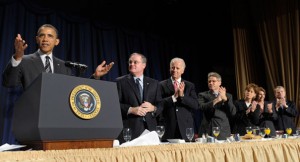 Normally, I would be pleased for a president to attend a prayer breakfast, as President Obama did yesterday. But it would have been better if he had just been an attendee listening to someone with a genuine Biblical message. Instead, he was the speaker, and he used the occasion to say Jesus would approve of his policies, specifically his proposal to raise taxes on the wealthy.
Normally, I would be pleased for a president to attend a prayer breakfast, as President Obama did yesterday. But it would have been better if he had just been an attendee listening to someone with a genuine Biblical message. Instead, he was the speaker, and he used the occasion to say Jesus would approve of his policies, specifically his proposal to raise taxes on the wealthy.
He used the Scripture that says more is required from someone who has been given much. Well, let’s look at that Scripture in context. It’s found in Luke 12 beginning in verse 42:
And the Lord said, “Who then is the faithful and sensible steward, whom his master will put in charge of his servants, to give them their rations at the proper time? Blessed is that slave whom his master finds so doing when he comes. Truly I say to you that he will put him in charge of all his possessions.
“But if that slave says in his heart, ‘My master will be a long time in coming,’ and begins to beat the slaves, both men and women, and to eat and drink and get drunk, the master of that slave will come on a day when he does not expect him and at an hour he does not know, and will cut him in pieces, and assign him a place with the unbelievers. And that slave who knew his master’s will and did not get ready or act in accord with his will, will receive many lashes, but the one who did not know it, and committed deeds worthy of a flogging, will receive but few. From everyone who has been given much, much will be required; and to whom they entrusted much, of him they will ask all the more.“
Where to begin?
First, the larger context of the passage has to do with the Second Coming. Jesus had just told a parable about those who were not ready. He then further explained that parable by telling this story. So far, there is nothing about the government taking more taxes.
Second, He emphasizes stewardship of whatever God gives us. The steward had a responsibility to carry out his particular tasks, and he needed to do so faithfully. One of those tasks was to provide rations to the master’s servants, but this is not a government endeavor. It’s simply using the master’s money to pay for services rendered.
Third, it’s an exhortation to stay focused and not allow oneself to turn to sin. He’s speaking of man’s propensity to follow his own selfish desires when he thinks the master [God] isn’t around to rebuke him.
Fourth, it offers a theology of divine punishment for those who don’t follow the will of God, but instead give themselves over to personal pleasures and desires.
Finally, we get to the line Obama used. It is a general principle that states the obvious: if you have been entrusted with much, you will be judged with a more stringent judgment. It actually places on emphasis on knowledge: those who know more, i.e., have a greater understanding of God’s will, and then disobey, will receive a stiffer penalty.
Nothing in the entire passage offers a hint of any government action, and certainly has nothing to do with sanctioning higher taxes on the wealthy.
Using Scripture for one’s own purposes by twisting it out of its context is deplorable. Mr. President, what you said at the prayer breakfast qualifies as deplorable.
